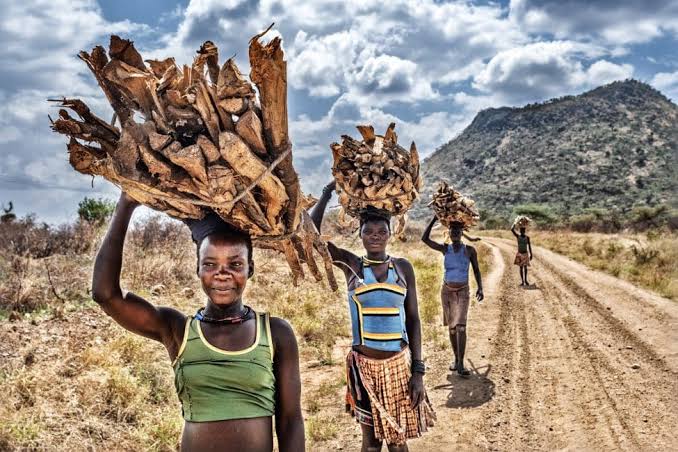The sun blazed mercilessly over Karamoja’s arid plains near Moroto, its heat baking the cracked earth where Atim sat with her younger brother, Lokong, under a scraggly acacia. At 21, Atim had known the rhythm of this land—herding goats, gathering wild fruits, the soft chants of her Karamojong songs echoing at dusk. But this afternoon, September 10, 2025, felt like a breaking point. The riverbed lay dry, goats staggered with hollow ribs, and her mother’s face bore new lines of worry. A drought had gripped the region for months, and aid trucks, promised by the government, were nowhere in sight. Atim’s heart ached. This wasn’t just a season; it was a threat to their way of life.
She stood, brushing dust from her skirt, and approached the village elder, Lokiru, his eyes shadowed with exhaustion. “Where’s the help?” she demanded, her voice steady despite the tremor within. He shook his head, muttering about broken promises. That night, Atim sat with her family around a dim fire, the silence heavy with hunger. “We can’t wait,” she said, her resolve hardening. Her mother nodded, offering a cracked water gourd. Inspired, Atim pulled out her phone—borrowed from a trader—and posted: “@KaramojaHope: Drought killing us in Moroto. No aid. We need water! #SaveKaramoja” (220 likes, 50 retweets). @UgandaRelief: “This is dire!”—a faint signal of support in the digital expanse.
The next morning, Atim walked the parched land, her sandals sinking into dust. She rallied the village—women with empty pots, children with tired eyes, men with cracked whips. They dug shallow wells, their hands blistering, singing Karamojong hymns to lift their spirits. She filmed their efforts, tweeting: “@KaramojaHope: Village digging wells in Moroto. Join our fight! #WaterForLife” (280 likes, 65 retweets). @NorthernAid: “Inspiring!” The video spread, drawing volunteers from nearby towns, their shovels a fragile hope against the drought’s grip. Atim sought solutions, learning from an NGO worker about rainwater harvesting. She gathered old tarps and barrels, teaching the community to collect every drop. She posted photos: “@KaramojaHope: Building rainwater systems. This is our water! #DroughtSurvival” (320 likes, 75 retweets). @GreenKaramoja: “Great initiative!” Hope grew, but the government’s silence fueled frustration.
Aid finally arrived—stale maize, not water—leaving Atim to distribute it. Her mother cooked a thin porridge, her hands trembling, while Atim spoke on a solar-powered radio, her voice a plea across the plains. Weeks passed, the wells yielding trickles, goats perishing despite their efforts. Lokong grew weak, his games forgotten. Atim walked at dusk, the dry wind whispering of lost herds. At a community meeting under a baobab, a friend, Nakiru, suggested a louder call. “Show the world,” he said. Atim posted a video—Lokong’s gaunt face, a dead goat, her mother’s silent tears—captioned: “@KaramojaHope: Our kids are starving. Where’s the aid? #HelpKaramoja” (400 likes, 90 retweets). @GlobalAid: “Raising this now!” The clip trended, pressuring officials to send water trucks, a temporary lifeline.
The delivery day came, a dusty afternoon under a relentless sun. Atim oversaw distribution, her hands steady as she filled jerricans. The district officer promised support, but delays loomed. She tweeted: “@KaramojaHope: Water trucks here! Safe for now, but we need more. #DroughtRelief” (450 likes, 100 retweets). @HopeUganda: “A start!” The village cheered, Lokong sipping water, his smile a flicker of life. Yet, the relief was fleeting. The trucks left, and rains failed again. Atim organized seed banks, planting drought-resistant crops with NGO help. She posted: “@KaramojaHope: Starting seed banks to fight drought. Join us! #ResilientKaramoja” (350 likes, 80 retweets). @FarmersUG: “Count me in!” The community rallied, their hands sowing hope. One evening, as the sun dipped, Atim sat with Lokong by a new sprout. “Will it rain?” he asked, his voice small. “If we keep trying,” she replied, her tone firm. She thought of her father’s herds, the land’s spirit. She tweeted: “@KaramojaHope: Lokong asked about rain. It’s our fight to bring it back. #KaramojaFuture” (300 likes, 65 retweets). @PastoralPride: “For our kids!”—a vow in the twilight.
The plains endured, scarred but stirring, a mirror to Karamoja’s struggle. Atim knew the drought might worsen, but the village’s unity, echoed by X, was her strength. She tended the sprout with Lokong, the plains’ rhythm returning, a promise to rebuild for him, for all of Karamoja.
This post was created with our nice and easy submission form. Create your post!





